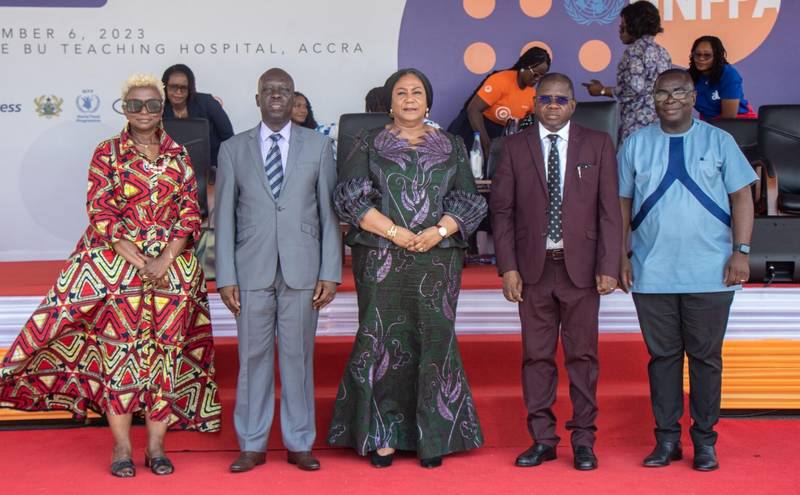In a resolute move to combat a pressing maternal health challenge, the United Nations Population Fund (UNFPA) Ghana has joined forces with the government of Ghana and other stakeholders in the country.
Their collaborative initiative, aptly named “Partnership to End Obstetric Fistula in Ghana (PEFIG),” aims to put an end to obstetric fistula, a preventable maternal morbidity that has plagued countless women in the country.
The launch event, which was held on Wednesday, December 6, 2023, at the Korle-Bu Teaching Hospital in Accra, witnessed impassioned speeches from the First Lady of Ghana, Her Excellency Mrs. Rebecca Akuffo Addo, the Country Representative of UNFPA Ghana, Dr. Wilfred Ochan, and other partners, highlighting the urgency and significance of this united front against obstetric fistula.
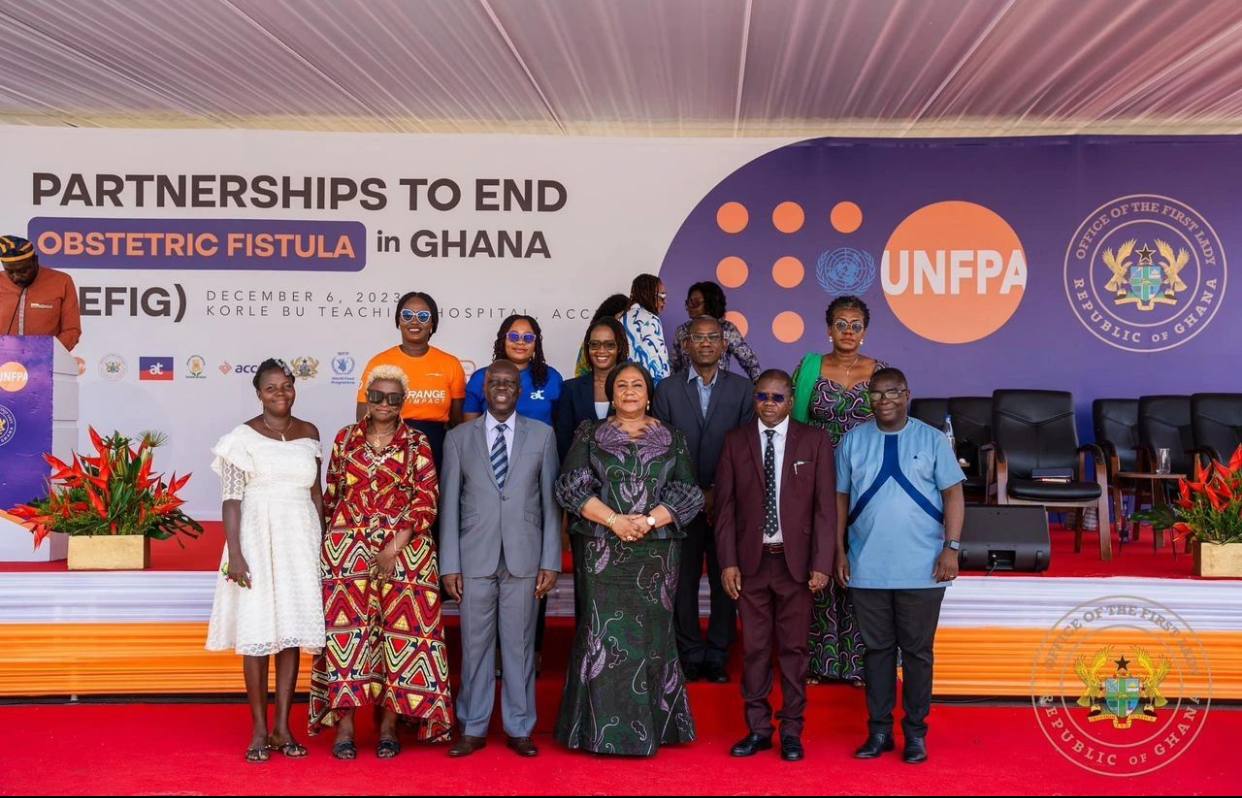
Addressing the audience, UNFPA Ghana Country Rep. Dr. Wilfred Ochan, highlighted the transformative power of partnerships in achieving crucial goals. He emphasized the devastating impact of obstetric fistula on women, turning a joyous occasion into sorrow and grief and sometimes leading to divorce.
“The role of partnerships in any endeavor cannot be overstressed. For UNFPA, partnership is key to achieving the three transformative results: zero preventable maternal death, zero unmet need for family planning, and zero gender-based violence, including harmful practices,” Dr. Ochan said.
“But for today, I wish to emphasize partnerships to end obstetric fistula, a preventable maternal morbidity. Although pregnancy should be a time of joy, pregnancy delivery should be a time of joy and jubilation for the mother, the partner, the children, and the community. But it sometimes ends in sorrow, bitterness, grief, regret over the loss of the baby, and sometimes divorce. In other families, it creates humiliation, desolation, shame, and stigma,” he added.
Dr. Ochan also expressed gratitude to the First Lady of Ghana, Mrs. Rebecca Akuffo Addo, for her unwavering commitment to eliminating obstetric fistula in the country and praised her pivotal role in advancing this cause.
Today marks another giant stride towards our agenda to eliminate this troubling situation of obstetric fistula among women. We at UNFPA Ghana want to express our sincerest gratitude to the First Lady of this country for her commitment to ensuring that the fight to eliminate this case has been won,” he said.
Dr. Wilfred Ochan further highlighted UNFPA’s support for Ghana’s National Obstetric Fistula Programme, including financial aid for surgical repairs, capacity building for surgeons, facility equipment, and advocacy efforts.
Dr. Ochan underscored the importance of an integrated and collaborative approach to successfully combating obstetric fistula and bringing back smiles to affected women. He emphasized the need for a comprehensive approach to end fistula and expressed gratitude to all public and private partners.
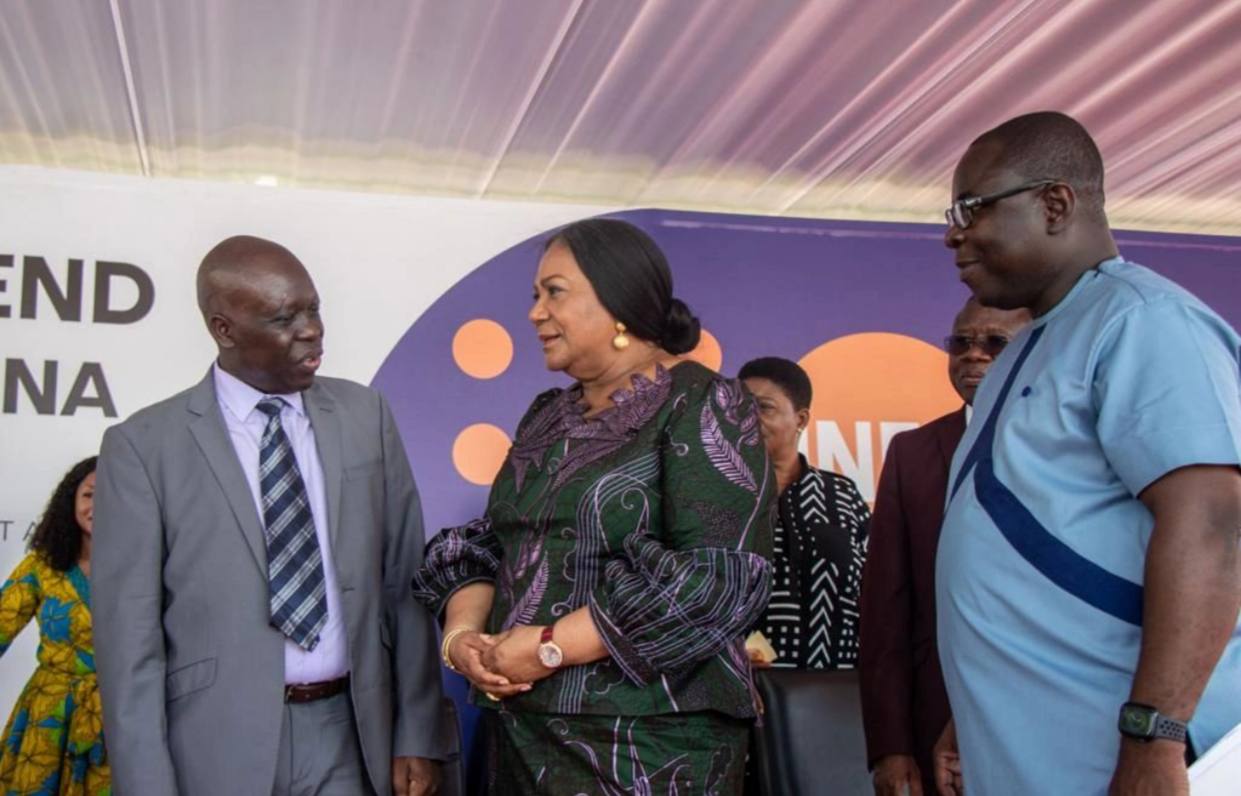
The First Lady of the Republic of Ghana, Her Excellency Mrs. Rebecca Akuffo Addo, while addressing the audience also acknowledged the natural desire of women to have children and the societal importance of childbirth. However, she underscored the current state of emergency, where a significant number of pregnancies become complicated, requiring urgent intervention.
Obstetric fistula, she noted, is a devastating consequence, causing shame, worthlessness, and social ostracization for affected women.
“Pregnancy and birth are God’s own plan to ensure the continuation of life. Women all over the world desire to have children as a biological and social cultural fulfillment of their life on this earth. As nations depend on births to replace the dead and weak, and look to each generation of children to invigorate society and create the innovations that make a nation great. Ladies and gentlemen, pregnancy is physiological and should follow a natural course until the child is born,” Mrs. Akuffo said.
“Yet as we have learned today, a significant number of pregnancies will become complicated and require urgent intervention to save the life of the mother and the unborn baby. Obstetric fistula is one of the worst things that can happen to any woman. Anticipated joy turns into a very difficult situation. A sense of shame and worthlessness ensues. This is worsened by the stigma and discrimination from their own spouses, families and community members. These women are ostracized and consequently lose their livelihood.,” she added.
The First Lady expressed hope, stating that with proper healthcare during pregnancy, fistula can be prevented, and for those who develop it, surgery can offer a remedy.
She further commended the collaborative efforts of UNFPA, the Ghana Health Services, the World Food Programme, Access and Fidelity Banks, the media, and other stakeholders in their determination to end obstetric fistula in Ghana.
“There is however some good news. That is why we are here today to give hope to women and their families that good health care during pregnancy can prevent fistula. For those who develop fistula, we know it can be repaired through surgery.
This means that PEF IG partnership, together with all stakeholders, must work hard to bridge the gap between current fistula repairs and actual numbers of women who suffer with fistula. I am therefore pleased that UNFPA, in collaboration with the Ghana Health Services, the World Food Programme, Access and Fidelity Banks, the media and others are determined to end obstetric fistula in Ghana,” she added.
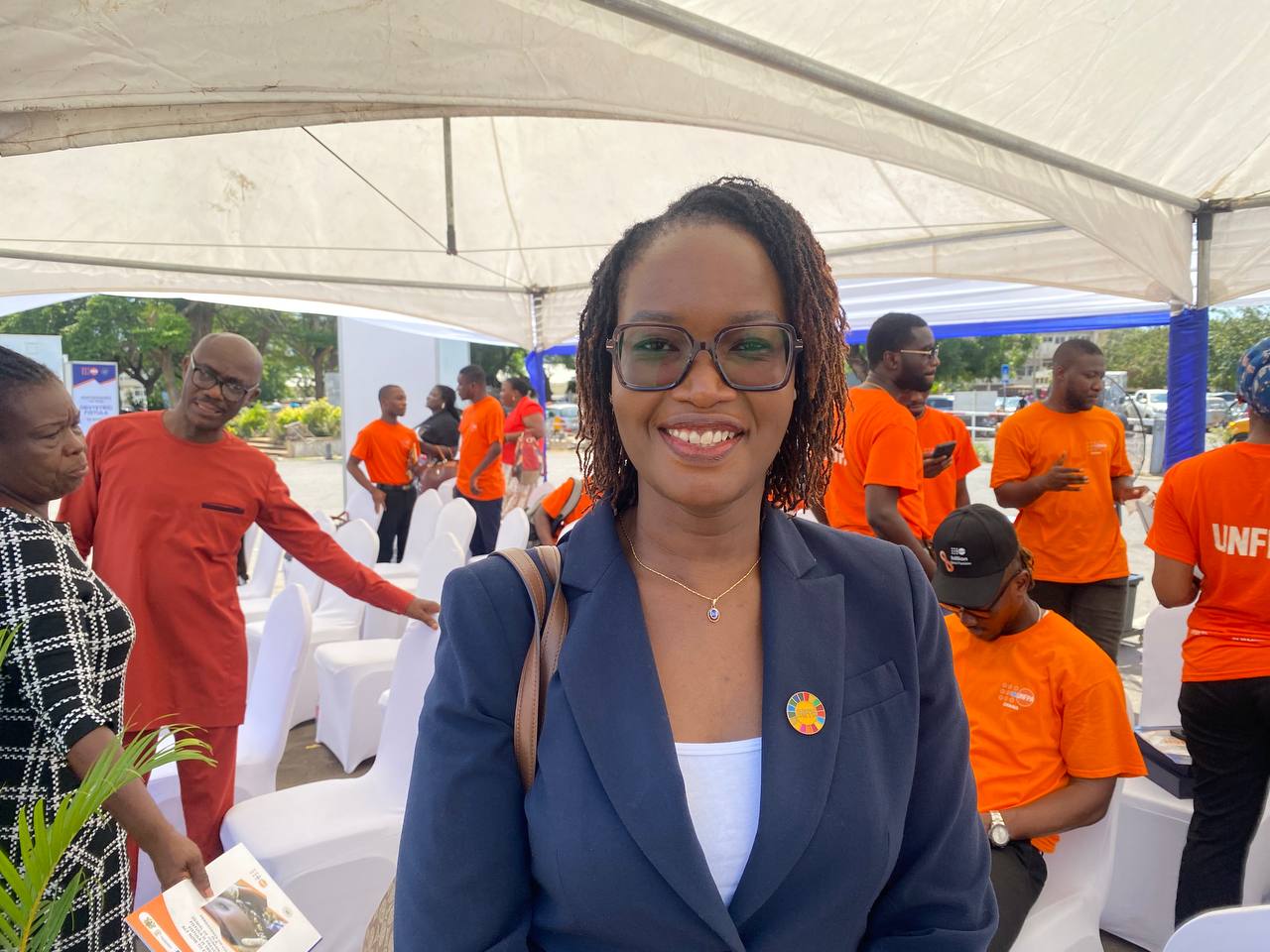
Deputy Representative of UNFPA Ghana, Dr. Emmily Naphambo, who spoke to UniversNews after the event, emphasized the collaborative nature of the initiative, asserting that partnering with various sectors is essential to achieving their vision of ending fistula within our lifetime.
Dr. Naphambo highlighted the proverbial truth that going alone may lead to a few steps, but partnering with others allows for a more profound impact.
The partnership welcomes contributions from the private sector, with a focus on diverse institutions. According to her, partnerships with UN agencies, government bodies, and organizations working in healthcare, particularly with the Ministry of Health and Ghana Health Service, are crucial for the success of the initiative.
“They say if you go alone, you’ll probably take a few steps. But if you partner with others, then certainly you’re going to go a long way. We cannot end this on our own. We need partnerships from all sectors, including the private sector. That’s why we are partnering with different private sector institutions. We need partnerships from other UN agencies, which is why we are also partnering with, for example, the World Food Programme.
Of course, we need a stronger partnership with the government agencies that work with the Ministry of Health, as well as the Ghana Health Service. Because at the end of the day, it’s a collaboration, everyone doing their own part, that will see us end fistula at some point in our lifetime,” Dr. Naphambo told UniversNews.
Dr. Naphambo clarified that while there is an annual international day commemorating fistula, the delayed launch of the partnership doesn’t diminish its significance.
The call to strengthen partnerships, especially in Ghana, gained momentum earlier in the year. The launch signifies a collective effort to raise awareness, conduct surgeries, and rehabilitate patients affected by fistula.
“Why has the light been turned on fistula now? Well, you know, every year there is an international day to commemorate fistula. But in Ghana, during the launch of that international day earlier in the year, around May, there was a call to really strengthen the partnership.”
It’s just that the launch of the partnership has been delayed a little bit, but the momentum has been building over the months, and the appetite to launch the partnership has been there. So UNFPA took the lead to ensure that we bring the partners together so that everyone contributes with whatever platform they can, from raising awareness to the actual conducting of the surgeries to the rehabilitation of the patients,” the Deputy Rep. added.
Country Director of World Food Programme (WFP), Barbara Clemens, who also gave a speech at the event, pledged continued support for the Fistula Program, emphasizing the holistic approach needed beyond surgical interventions.
She expressed dedication not only to the current program but also to exploring expanded initiatives that address the multifaceted challenges faced by women.
Addressing the broader context of food security, Ms. Clemens highlighted the pivotal role women play. The WFP recognizes four dimensions of food security: access, availability, utilization, and stability.
According to her, for women affected by fistula, these dimensions are compromised, affecting their ability to access, acquire, and utilize food, ultimately destabilizing their food security.
“In our work at WFP, we are focused on food security and nutrition. And I think we, as women, WFP recognizes, are at the helm of securing our food security. We liken it to four dimensions of food security: people having access, availability of food, utilization, and stability,”.
And for a woman who is suffering from this problem, she will not have the same access that I will have. She will not, and therefore food will not be available to her, let alone to even utilize, and therefore her food security will not be stable. So I commit the World Food Program to continue supporting the Fistula Program. I also pledge my personal support,” she said.
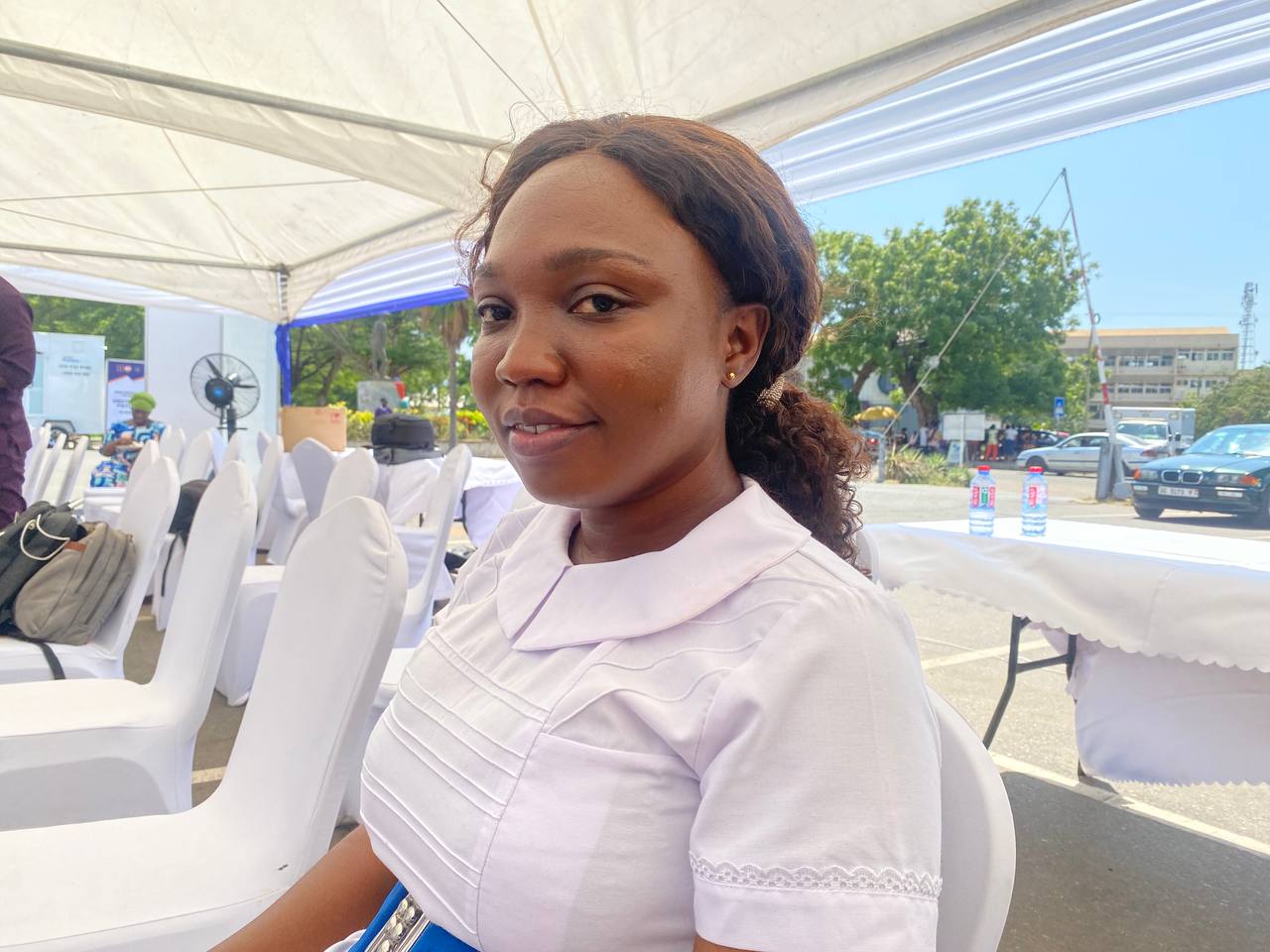
Finally, in a heartfelt expression of appreciation, Priscilla Owusu, a dedicated nurse with almost seven years of service at the Korle-But Teaching Hospital, lauded the Obstetric Fistula Campaign as a pivotal initiative that holds the potential to significantly impact societal well-being.
Her sentiments reflect the gratitude and hope echoing among healthcare professionals witnessing the campaign’s unprecedented focus on a critical yet often overlooked health concern.
According to her, in her tenure at the Korle-But Teaching Hospital, this marks the first dedicated effort she has witnessed specifically addressing obstetric fistula. Her words underline the rarity of such campaigns and the unique opportunity they present to raise awareness and address crucial health issues affecting women.
“I honestly think this campaign will help our society, especially those who are not able to afford it. It will really help them. I also pray that there will be more campaigns so that people will be aware of these issues in our society.
In my almost 7 years of duty as a nurse in this hospital, this is the first obstetric fistula campaign I have seen. I pray God blesses UNFPA and other partners, and I pray they are able to do more for us as a society,” she told UniversNews.
As Ghana rallies its efforts to end obstetric fistula, PEFIG stands as a beacon of hope, bringing together diverse stakeholders to address the challenges faced by women and contribute to the broader goal of achieving zero preventable maternal deaths, zero unmet need for family planning, and zero gender-based violence.
Overview of Obstetric Fistula
An Obstetric Fistula is a medical condition in which a hole develops between the vagina, rectum, and/or bladder as a result of prolonged and/or obstructed labour i.e., when a baby is not able to come out of the birth canal easily.
Affected women leak either urine, or faeces or both through the birth canal.
Obstetric Fistula is a global problem, but it is especially common in developing countries, such as Ghana.
The United Nations therefore set aside May 23rd of every year to be commemorated as the International Day to End Obstetric Fistula.
Fistula occurs in all regions of Ghana, with the largest number in the northern part of the country.
–
Story by: Kelly Adjetey Boye | univers.ug.edu.gh

